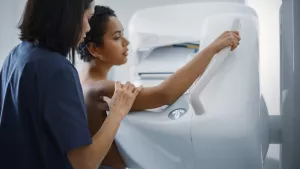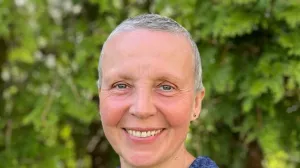When it comes to your breast health, we offer kind and caring support that’s just right for you. We provide everything from the latest screenings and tests to advanced surgery and chemotherapy treatments. Tufts Medicine is your place for complete breast care.
Supporting your best health with breast health
We’re here to support you in your breast health journey. If you’re at high risk for breast conditions due to personal or family history, we’ll help you with options like genetic counseling and personalized treatments. And, if breast cancer or another condition is found, we offer advanced treatments, including oncoplastic surgery and clinical trials.
It's important to note that if you notice changes in your breasts, such as lumps, discharge or unusual pain, see a doctor right away. You can start by contacting your primary care doctor or OBGYN. Early detection is key to getting the right treatment and staying healthy.

Conditions
We help with all kinds of breast conditions, both non-cancerous and cancerous, including:
Testing
Your care team will recommend tests that are right for your age to keep track of your breast health. Your doctor will consider your personal and family health history when deciding which tests to take to better understand your health, which may include:
- Blood work
- Breast biopsy
- Breast cyst and fine-needle aspiration
- Breast MRI
- Breast ultrasound
- Galactography
- Mammogram
- Needle localization
- Genetic cancer risk assessments
- Sentinel node studies
Breast MRI
Magnetic resonance imaging (MRI) is an imaging test that uses a strong magnetic field and radio waves to take pictures of the inside of your body.
Your doctor may recommend a breast MRI to:
- Compare scar tissue following breast cancer surgery
- Evaluate breast implants and the surrounding tissues to check for infections or other abnormalities
- Examine the breasts of a person who’s newly diagnosed with breast cancer prior to any surgery
- Get a closer look at abnormalities found during a physical exam, mammography or ultrasound
- Track the effectiveness of chemotherapy treatment for people living with breast cancer
Breast ultrasound
If we find something abnormal or suspicious in a mammogram or another imaging test, we may follow up with a breast ultrasound to pinpoint a diagnosis.
A breast ultrasound only takes about 20 minutes to complete. During this exam, a sonographer scans the breast area using sound waves to produce images that our radiology team analyzes.
Mammography
Mammograms are special X-rays of the breast that use a small amount of radiation. Regular mammograms can help find breast cancer early, which makes it easier to treat. They can often detect changes in the breast that could be cancer years before any symptoms show.
At Tufts Medicine, we use 3D mammograms to help you manage your breast health. These give us a clearer view of the breast, helping us find any changes sooner.
We agree with the American Cancer Society's recommendation that women and people assigned females at birth (AFAB) start getting mammograms every year, starting at age 40. Why age 40? Because the risk of getting breast cancer increases a lot around this age. Women in their 40s can get breast cancer up to three times more often than women in their 30s.
That’s why we encourage everyone to take charge of their health and get regular mammograms.
Treatments
Once we've diagnosed your condition or have a better understanding of the type of care you'll need, we'll design a treatment plan that's uniquely you. We may recommend the following treatments, ranging from lifestyle changes to medication and surgery:
- Biotherapy
- Breast surgery
- Chemotherapy
- Complementary and holistic medicine
- Immunotherapy
- Infusion services
- Oral oncolytics
- Plastic surgery
- Radiation therapy
Breast surgery + oncoplastics
We use the latest methods in breast surgery to treat breast cancer and different non-cancerous breast conditions. Our goal is to help you get back to your life and stay cancer-free.
One of these new methods is oncoplastic breast surgery. This special “2-for-1” procedure removes a tumor and rebuilds the breast at the same time. Doing both at once means you’ll have fewer surgeries and a quicker recovery. Based on our patient history, 90% of people are cancer-free after oncoplastic surgery. Plus, you’ll leave feeling comfortable and confident in how you look.
Oncoplastic surgery requires special skills, and only about 60 doctors in the country are certified to perform it—including our doctors at Tufts Medicine.



FAQs
About 1 in 8 women and individuals assigned females at birth (AFABs) will develop breast cancer during their lifetime.
About 1 in 1,000 men and individuals assigned males at birth (AMABs) will develop breast cancer during their lifetime.
If you notice anything unusual about your breasts, contact your medical provider right away. The American College of Radiology recommends starting annual mammography screening at age 40 for women of average risk of developing breast cancer.

From regular office visits to inpatient stays, find the healthcare you need and deserve close to home.

Meet the doctors and care team devoted to supporting you every step of the way along your path to better health.